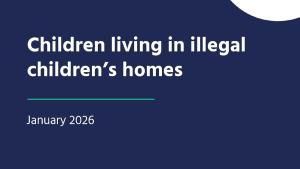Foreword by Dame Rachel de Souza
Family is central to all of our lives, particularly children, for whom family is the prism through which the world is experienced. That is why I was excited to be asked to undertake the Independent Family Review and am so pleased to be publishing Part 2.
At its core this Review has been a celebration of the power of families to support and sustain all of us. More than anything, I want this Review to put strong and loving families front and centre of our politics and policy making. This may sound obvious, or even trite, but actually it is a paradigm shift from our current approach to family policy. For too long, we have seen family life as beyond the realm of public policy, with the result that policy is designed for ‘households’ or individuals, or even ‘service users’, instead of families, parents, and children. Family services are seen as for those who are struggling and policymakers tend to see families for the collection of challenges they face, rather than the innate power they hold.
Instead, I have established that all families tend to want the same core things: families want to get along and love one another, they want to be able to support themselves and each other, to spend quality time together, and to able to trust and rely on each other. Moreover, in Family Review: Part 1 I was able to demonstrate that the presence of these factors provides a strong protective effect over family members, promoting well-being and children’s outcomes as well as insulating families from hard times. This Review has provided not only a clear formulation for what constitutes a strong family, but also an inclusive one. Family comes in many forms. For nearly everyone it includes people outside our ‘immediate family’ and understanding this is vital to developing a concept of families which recognises that while the composition of families may change, their importance does not. The concept of family used throughout this report is one that has come from families themselves. It is broad, varied, and dynamic. And where a child cannot live with their birth parents, I want the system to provide a meaningful alternative. In the new year I will publish deep-dives into children in care, those living in the secure estate and those inpatient mental health settings. I will provide solutions to some of these acute and unique circumstances.
Understanding the way in which families help one another is vital for understanding how public services can better support them. The starting point is a recognition that most families want or need support in some form. Families give and receive support within their extended networks of family and friends. For public services to truly provide for families they should seek to support these networks and replicate their strengths when providing help. This means services which feel familial: are consistent, reliable, non-judgemental, and accessible. This report lays out how this can be done.
None of this is easy. Throughout this Review I’ve encountered professionals at all levels who understand what is needed but are struggling to put this into practice because of some consistent barriers within the system. To tackle these, I’m publishing three reform guides alongside the Review addressing some of the thorniest issues when it comes to reforming and integrating different public services. The guides cover: data-utilisation; local integration and outcome frameworks. In each, I have asked the question: what do families need from the system, and what is stopping professionals putting into practice? My proposals bring a fresh perspective, and some simple recommendations, to some longstanding challenges.
If we really want to help families, so we can help children, we must look at parenting. We all know how important parents – including, of course, carers – are and the role they play to improve their children’s lives. Parents know more than anyone the challenges of bringing up children. They want to do what is best for their children, to grow up happy and healthy, to do well at school and to ensure everyone in the family gets on. This Review starts to quantify just how important parents are. Our research reaffirms the strong link between key parenting behaviours and children’s outcomes – whatever a family’s circumstance. Whilst policymakers can sometimes see parents as beyond the realm of public policy, speaking to parents during this Review made it clear that they want their role acknowledged.
Parenting behaviours do not always match this aspiration. When we asked children what they did over the summer holidays, 79% of children who responded to The Big Summer Survey spent time reading, writing or doing art during the summer holiday, but only 30% did so with a member of their family. Yet these activities are clear examples of ways parents can support their child do well at school.
This Review has given me the opportunity to hear from parents. I have heard how much they want to support their children, but, that some are not always confident about their own abilities, and do not know where to go for advice. Professionals working with children and families are not clear what messages they should be giving to parents, or where to sign-post for information. This is not about telling parents how to parent, or whether to adopt permissive or authoritarian parenting styles. It is also not about blaming parents, many of whom face enormous challenges. It is about imparting clear information, setting clear expectations, and ensuring that support and advice is readily available. This is about parents understanding the importance of reading and counting; the role of play and how important it is to set clear boundaries. Sometimes, parents need practical advice to give them the confidence to put this into practice.
The biggest thing that needs to change is attitudes. What stops parents seeking support is the sense that to do so implies they have failed as a parent. Parenting classes empower parents to make better decisions, reflect on their approach and develop clear strategies to help their child. There is overwhelming evidence that shows that this helps children’s wellbeing, development, and lifetime outcomes, yet many parents wouldn’t know that parenting classes were an option.
One of the most important insights from the research we have undertaken with families is that all parents have some struggles, and times they will need to reach for help. Acknowledging this is a vital pre-requisite for changing the relationship between the state and families, but it starts not with Government policy, but with all of us. One contributor to this Review likened this to changing attitudes around things we are comfortable acknowledging in our lives now: ’10 years ago it was difficult to talk about mental health, to say you were struggling, or were just having a bad day. People covered it up and made excuses. Today we are in the same position with parenting. Parents do an amazing job, they’re so important to their children’s lives, but everyone finds it a struggle at times. To different degrees and in different ways. But admitting this is seen as an admission of failure.’ This Review hopes to be a catalyst for a new conversation about raising a family, that we can all engage in.




